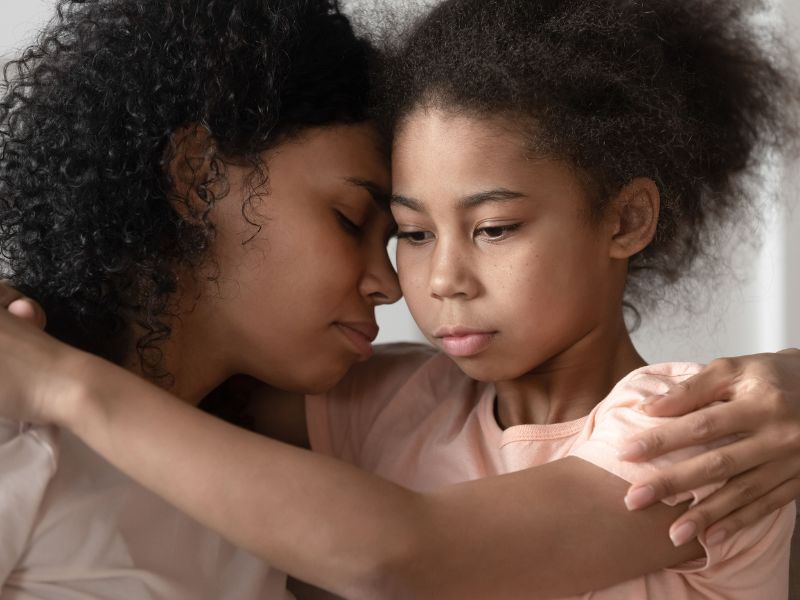The death of a loved one is very difficult for everyone in the family. However, children also feel the loss deeply and can grieve differently from adults. It is important that you are present, kind, compassionate and mindful of ways to support your grieving child. The local nonprofit CaringMatters provides many resources and services, free of charge, to support grieving adults, children and families. Below is a guide for parenting a grieving child or teen.
1. Be honest.
Speak openly and discuss the death using clear, simple, age-appropriate language. Children need to hear the truth from someone they love and trust. Be guided by their questions and know that it’s OK if you don’t have all the answers. Use words like “dead” and “died” so they gain understanding. Avoid terms like “went to sleep” or “lost” which can be confusing. It is important that children don’t associate the death with anything other than the reality of how it occurred. Pause the conversation if that seems best.
2. Listen.
Be patient and present as you listen to your child tell their story and explain their feelings. To help them feel heard and supported, listen without jumping in and trying to fix something or make it better. Encourage their questions and answer as best you can. Remember that this is not a one-time conversation. You don’t have to share all the details at once. Provide opportunities for small conversations over time.
3. Be consistent with rules and stick to your family’s routine.
Children feel most secure when they know what’s expected of them. A grieving child may use their pain as an excuse for inappropriate behavior. Acknowledge their grief and teach them accountability for their choices, no matter what they feel.
4. Talk about and remember the person who has died.
Keep a loved one’s memory alive through stories, photos, holiday traditions and rituals, and mention them in daily conversations. CaringMatters’ Family Nights program brings grieving families together virtually to remember their person with an art project and discussions of how to plan for holidays and special days, such as Mother’s and Father’s Day, without their loved one.
5. Be open to different ways of grieving.
Each child’s grief is unique and ongoing. Many children may use play or creative activities, such as drawing or writing, to express their grief. Ask them to tell you about their artwork or story. Their response can give clues to how they are coping, but don’t make assumptions. Just because a child is playing or drawing a happy scene doesn’t mean they are not grieving. Often these activities allow them to gently process their grief and provide better understanding of these painful feelings.
6. Get extra help if needed.
There are many ways to support a grieving child, including community- and school-based programs that provide opportunities to meet and interact with other children who have had a loved one die. A mental health professional and the child’s pediatrician can also be good sources of support if a parent has ongoing concerns about their grieving child.
7. Take care of yourself.
If you are also grieving, it is important that you try to eat well, get some sleep, exercise and reach out to others for support. Grieving children do best with support from a caring adult who is taking care of themself and attending to their own grief.
CaringMatters’ programs, offered free of charge, include Good Grief Clubs (held in schools) and Camp Erin. They help grieving children and teens explore their feelings, develop healthy coping strategies and find comfort and safety in learning that they are not alone. For grieving parents, CaringMatters offers online adult bereavement support groups composed of caring people grieving a similar loss. Support group members benefit from the collective wisdom and empathy of others. In addition, the Parenting While Grieving Online Workshop Series provides peer support for grieving parents and includes practice of essential parenting skills, such as listening, expressing, problem-solving and setting limits within the context of a grieving family.
Other Helpful Online Resources
- Dougy Center, The National Grief Center for Children & Families
- National Alliance for Grieving Children
- New York Life Foundation Bereavement Support for Families
Related
10 Ways to Help Your Kids When the World Feels Scary
Talking With Your Children About School Shootings


